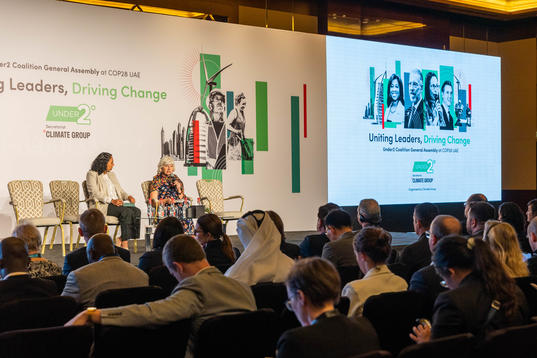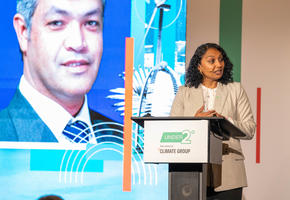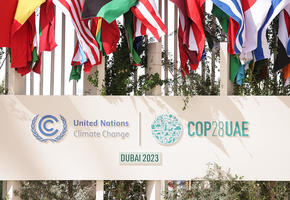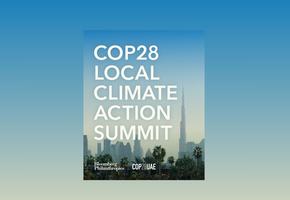The Under2 Coalition General Assembly was held in Dubai on 3 December alongside the COP28 Summit.
This was the Coalition's biggest meeting to date, with over 65 subnational governments joining businesses and civil society for a day of talks and activities aimed at uniting leaders, driving change.
In a packed agenda, governments heard from Paris Agreement architect Laurence Tubiana, and former UN Secretary General Ban Ki-moon, as well as Governors and Ministers from across Africa, Asia, Europe and the Americas.
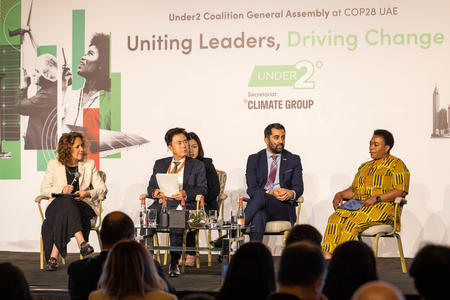
Following the first ever Local Climate Action Summit (LCAS) on 1 and 2 December, the day provided an opportunity for states and regions to come together and reflect on their successes over the past year but also to consider what still needs to be done.
Subnational governments are on the frontlines of responding to the climate emergency and a recurring theme was the desire for them to have a more formal role in international climate processes, such as COPs. As the level of government closest to the communities they serve, they are also often able to enact climate laws and policies within their jurisdictions that respond to people's needs and bridge the gap between pledges and action.
The Coalition now represents 177 subnational governments, which includes 80% of states in Brazil - the country that will host COP30 in two years' time. Yesterday it added two new members to its number: Taraba State in Nigeria and Goiás in Brazil.
Taraba State has officially joined the Under2 Coalition. As Governor, I am eager to contribute our efforts toward the Coalition's goal of reaching net zero emissions by 2050 or earlier. We are outlining realistic steps to achieve this. Subnational governments play a crucial role in implementing climate actions. As local leaders, we appreciate the impact of climate change on people’s everyday lives, affecting living and working conditions. That's why it’s more important than ever for states, regions and other subnational governments to come together to address climate issues. This must be done for our children and future generations to have a safe Earth, and I am proud that by joining the Under2 Coalition, Taraba will contribute to this great challenge.
Taraba State has officially joined the Under2 Coalition. As Governor, I am eager to contribute our efforts toward the Coalition's goal of reaching net zero emissions by 2050 or earlier. We are outlining realistic steps to achieve this. Subnational governments play a crucial role in implementing climate actions. As local leaders, we appreciate the impact of climate change on people’s everyday lives, affecting living and working conditions. That's why it’s more important than ever for states, regions and other subnational governments to come together to address climate issues. This must be done for our children and future generations to have a safe Earth, and I am proud that by joining the Under2 Coalition, Taraba will contribute to this great challenge.
Three Under2 Coalition co-chairs - Chungnam in South Korea, KwaZulu-Natal in South Africa and Scotland in the United Kingdom - used their platform to press delegates on the need for a stronger approach to the phaseout of fossil fuels, a focus on just transition and a renewed commitment to resilience and adaptation.
First Minister of Scotland, Humza Yousaf, welcomed the energy of states and regions and their enthusiasm for tackling the biggest challenges, saying “the beauty of the Coalition is that we all face common challenges…but we can learn from each other”. This was echoed by Governor Kim of Chungnam, who called for more members to sign up to action because more voices are needed to drive progress globally.
Regional speakers across the conference also repeated the concerns of other subnational governments when it comes to financing a better future. Minister Walker of Baden-Württemberg said that "there is enough money around the world – the only question is which direction it goes in", while Governor Barbalho of Pará reiterated the need to support communities locally in order to support ecosystems globally. In talking about protecting rainforest in his state, he said “if the world is concerned about the Amazon forest it must also be concerned about the people who are living in the forest region.”
How many COPs before we say what is clearly obvious – the climate crisis is a fossil fuel crisis and there is no pathway to net zero if we continue using fossil fuels.
How many COPs before we say what is clearly obvious – the climate crisis is a fossil fuel crisis and there is no pathway to net zero if we continue using fossil fuels.
COP28 has focused more on subnational governments than any other COP before. Over the first few days of the days states and regions also made a series of announcements to demonstrate their leadership on climate:
- 65 governments and partner organizations signed up to the LGMA's climate action paper at the start of COP28;
- Over 60 national governments supported the Coalition for High Ambition Multi-level Partnerships (CHAMP), which asks nations to commit to consulting their local and regional governments to build their national climate goals;
- The Under2 Coalition contributed to a new report that makes recommendations for subnational governments to ensure their net zero goals have credibility, accountability, and transparency while acknowledging their varied capacities and characteristics;
- Scotland committed to new funding for clean and reliable energy in three African countries;
- California formally launched a Subnational Methane Action Partnership with 15 governments now working together to cut emissions of this harmful gas;
- Catalonia and California announced a Mediterranean Climate Action Partnership for 14 states and regions with similar weather patterns to share knowledge;
- New South Wales published a series of policy compendium on nature-based solutions through the Net Zero Futures Policy Forum: identifying examples of best practice across Australia.
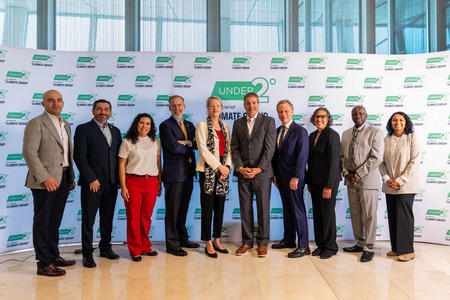
The General Assembly concluded with a series of sessions focused on specific climate issues, ranging from methane emissions to a just transition, sustainable steel and climate finance. These brought together experts with governments and businesses keen to take new information back to their states and regions so that they could do more on the ground where they live.
There were also discussions around the application of accurate and timely data in building up local climate resilience. With one of the key themes of COP28 being the need to adapt to changing conditions, this was a timely way of thinking through new ways of protection people and ecosystems in the most effective ways possible.
The big challenge over the next year will be maintaining the momentum of COP28 and ensuring states and regions remain at the centre of environmental discussions and decisions – where they belong.
